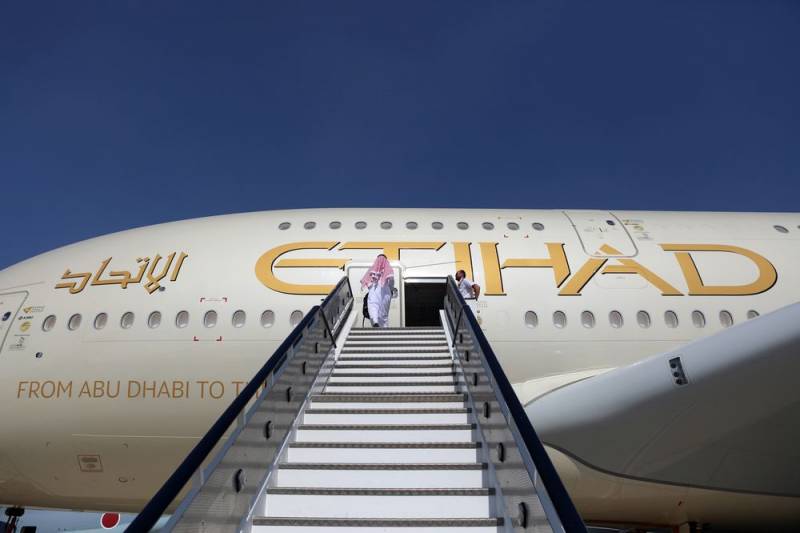Originally posted to the Associated Press News website, 19 May 2020
DUBAI, United Arab Emirates (AP) — An unmarked Etihad Airways cargo plane flew aid to help the Palestinians fight the coronavirus pandemic from the capital of the United Arab Emirates into Israel on Tuesday, marking the first known direct commercial flight between the two nations.
The UAE, home to Abu Dhabi and Dubai on the Arabian Peninsula, has no diplomatic ties to Israel over its occupation of land wanted by the Palestinians for a future state, like all Arab nations except Egypt and Jordan.
Yet the flight marked a moment of cooperation between Israel and the UAE after years of rumored back-channel discussions between them over the mutual enmity of Iran and other issues.
Etihad, the state-owned, long-haul carrier based in Abu Dhabi, confirmed it sent a flight Tuesday to Tel Aviv’s Ben Gurion Airport.
“Etihad Airways operated a dedicated humanitarian cargo flight from Abu Dhabi to Tel Aviv … to provide medical supplies to the Palestinians,” the airline told The Associated Press. “The flight had no passengers on board.”
In the past, private and diplomatic planes often had to travel to a third country before heading onto Israel.
Emirati government officials did not respond to multiple requests for comment.
The UAE’s state-run WAM news agency later issued a statement saying it delivered 14 tons of protective gear, medical items and ventilators “to curb the spread of (the) COVID-19 pandemic and its impact in the occupied Palestinian territory.” It did not acknowledge the flight’s significance.
The cargo flight landed at Ben Gurion on Tuesday night, with ground crews pulling out pallets of cargo bearing both the Emirati and Palestinian flags. It will go toward U.N. efforts to fight the outbreak.
Neither the Gaza Strip nor the West Bank have their own airports, meaning most cargo bound for Palestinian territory must enter through Israel. That likely required an airlift of the material from the UAE, which hosts humanitarian stockpiles for the United Nations.
The UAE, a federation of seven sheikhdoms founded in 1971, had no significant history with Jews unlike other Persian Gulf nations. While not acknowledging Israel diplomatically, Emirati officials have allowed Israeli officials to visit and the Israeli national anthem was played after an athlete won gold in an Abu Dhabi judo tournament. Israel also has a small mission representing its interests at the International Renewable Energy Agency in Abu Dhabi.
Next year, Israel will take part in its delayed Expo 2020, the world’s fair being hosted by Dubai. A secret synagogue also draws practicing Jews in Dubai. The UAE also has announced plans to build the Abrahamic Family House in Abu Dhabi, which will house a mosque, a church and a synagogue. Israelis traveling with Western passports routinely enter the UAE without a problem, though one still can’t make a phone call between the two countries.
Oman, which has ties with Iran, hosted Israeli Prime Minister Benjamin Netanyahu in a surprise visit in 2018 that served to remind Washington of its unique ability to be a conduit for talks. Saudi Arabia and the UAE also have allegedly used Israeli spyware to go after government critics.
But such ties remain highly contentious among the Arab public, particularly as the Palestinians remain without a state of their own despite decades of talks. The UAE as recently as May criticized Netanyahu’s plans to annex parts of the occupied West Bank and warned of “dangerous repercussions.”
Tensions also rose between Israel and the UAE after suspected Mossad assassins killed a top Hamas operative in a Dubai hotel room in 2010, something never acknowledged by Israel.
All of those concerns likely played a part in Etihad’s decision to fly a white, unmarked plane into Tel Aviv, following Egypt’s model for its own flights to Israel on its Air Sinai routes.
The hereditarily ruled UAE also remains suspicious of Islamists like the militant group Hamas that holds the Gaza Strip. Qatar, which the UAE has boycotted since 2017 in a bitter political dispute, donates funds to Gaza. The Qataris often serve as mediators between Israel and Hamas, which have fought three wars.
Israel and the Palestinian Authority imposed sweeping lockdowns in mid-March aimed at containing the virus, limiting travel and public gatherings and forcing nonessential businesses to close. Many of the restrictions have been lifted in recent weeks as the rate of new infections has declined.
Israel has reported more than 16,600 cases and around 270 deaths, with more than 13,000 of the patients having recovered. The Palestinian Authority has reported around 390 cases and two fatalities, with around 340 people having recovered.
The virus causes mild to moderate symptoms in most patients, who recover within a few weeks. But it is highly contagious and can cause severe illness or death, particularly in older patients or those with underlying conditions.
The Al-Aqsa mosque in Jerusalem, the third-holiest site in Islam, will reopen next week after the conclusion of a major holiday marking the end of the holy fasting month of Ramadan. It follows weeks of closure aimed at preventing the spread of the coronavirus. It had been closed since March over the virus.
Meanwhile on Tuesday, Etihad also acknowledged it had fired staffers over the pandemic grounding flights worldwide.
Since 2016, Etihad has lost a total of $5.62 billion as it struggles to restructure.
Link to the original post : https://apnews.com/7dd4bb9878fe9519a924ac6745340e87


